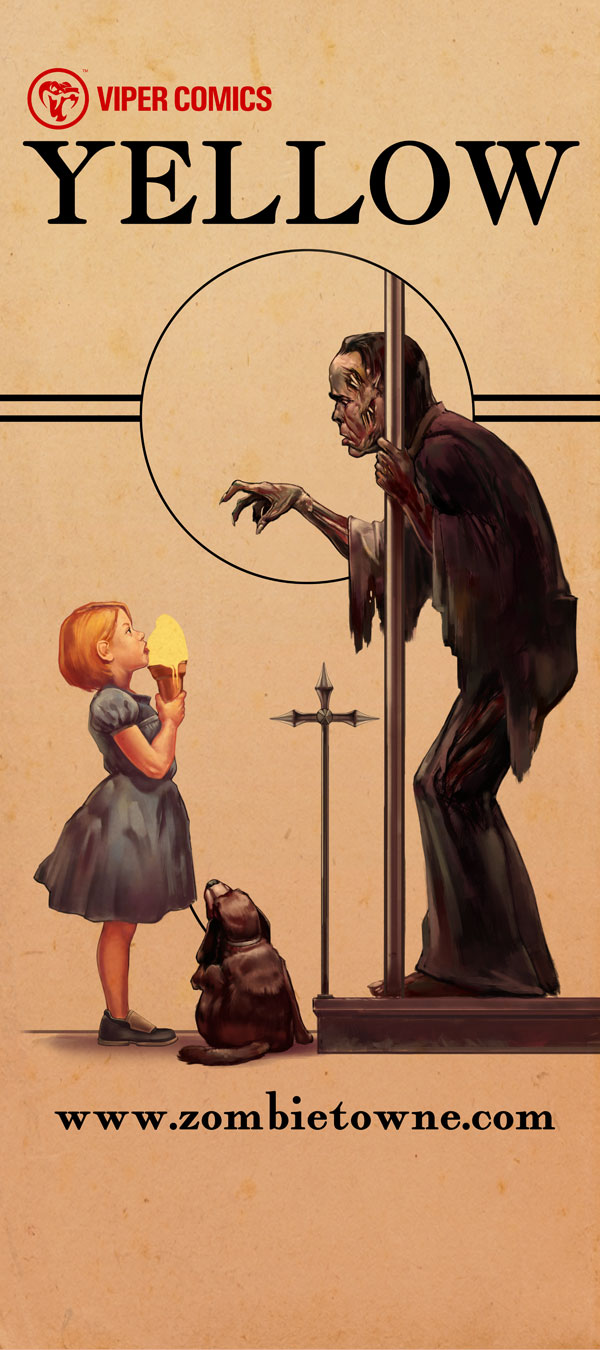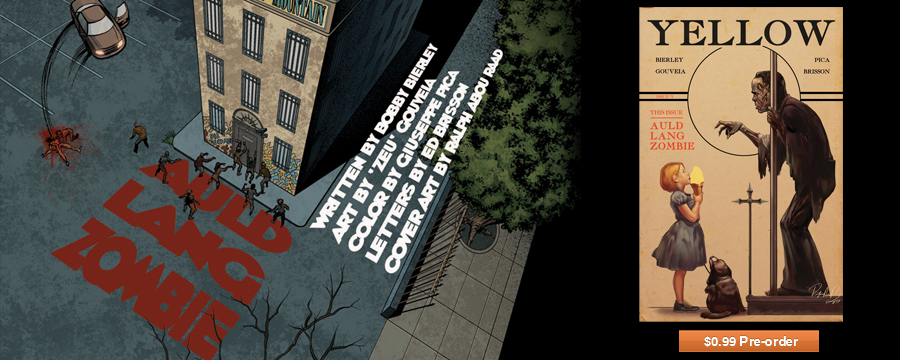“Yellow” Is Not Just a Zombie Story

Get to know one our latest creators to join the Viper Crew, Bobby Bierley as he talks about comics and his latest project “Yellow”.
 Q: For starters, tell a fun fact people do not know about you?
Q: For starters, tell a fun fact people do not know about you?
I moonlight as a referee for a roller derby league in Kansas City called the Dead Girl Derby. Right now I’m on a hiatus from it as I’m working around the clock to get YELLOW into the hands of the teeming masses, but I plan on returning as soon as I can.
Q: Who had the biggest influence on your career?
Well I didn’t really grow up reading a lot of comics, so my influences were mainly television writers and screenwriters. I know it may be sort of passé in some of the elite circles, but I love Joss Whedon for his unique ideas and his grasp of dialogue. Nobody really talks like Whedon characters, but he makes you believe they do. I also love Aaron Sorkin for much the same reason.
I loved the series LOST, too, so a lot of those guys are on my list. Abrams, Cuse, Kitsis, Horowitz, and Grillo-Marxuach. They all brought something great to the table, whether it was ideas or characters or dialogue. I can’t stress enough how much engaging dialogue can lift up even the worst concepts. Just look at “Dollhouse”. (That one was for the elite circles. I actually loved “Dollhouse”.)
But I also have to give props to my wife Emily, who has been unwaveringly at my side through this whole process—except when she was behind me, shoving me out of my safety bubble and into the great unknown. Thanks, Em.
Q: In one sentence describe Yellow?
Oh, geez. You gave me this question on purpose because I told you how much trouble I have summarizing this story, didn’t you?
How about this: Years after the zombie apocalypse, a lonely high-schooler falls in love with the most beautiful zombie at the zombie zoo, and must decide how far he’s willing to go to protect her from those who would exploit her beauty for profit.
Or there’s the short, short version I often use at conventions: It’s just another a post-zompocalyptic comedy adventure love story.
Q: How did you break away from all the other creature / zombie books?
It wasn’t my intention to do that, first of all. In fact, back in 2004 when I first started working on the idea I wanted to do a very cliché zombie story. I was going to film school at the time and this was when this sort of zombie renaissance we’re in was just starting to gain momentum with movies like Zack Snyder’s DAWN OF THE DEAD remake. I wasn’t a huge fan of the genre, but I liked the idea of a zombie movie. I liked the challenge it presented from a storytelling perspective, because zombie movies have rules and expectations, and the challenge is to create a fun, entertaining story that can deliver within those parameters.
As the story festered in the recesses of my mind over the next several years, it stopped being merely a zombie story, and turned into a story that just happened to have zombies in it. I still don’t know what genre it is, exactly, but I think people will take away more than just “zombie story” when they’re done reading it. At least I hope so.
Q: Without taking the basic fundamentals of Zombies that we have become accustomed to, how can Yellow change the perspective?
Well I think the biggest thing that distinguishes Yellow from the majority of zombie comics out there is that, for most of the story, the zombies are not really a threat. Flashbacks notwithstanding, it all takes place years after the zombie apocalypse. (That’s another tale. And one I would love to explore in a spin-off series, by the way…) Yellow isn’t about the zombies wanting humans, it’s about humans needing them.
It’s like ROBOCOP. That movie has fighting robots blowing things up, which is obviously awesome, but it’s different than the robot element in, say, TERMINATOR. And that’s because the robots in ROBOCOP are really only secondary to the plot, which is about humans doing what humans do, which is try to make money. That’s why certain comics like X-MEN, in the right hands, really elevate themselves above the rest. The super powers—which we can’t actually relate to—aren’t as important as the characters and their struggles that we can relate to.
Q: Who is your favorite character in Yellow?
Well I’m pretty partial to the main character, Quinn, because he’s heavily based on me in high school—flaws and all. He’s girl-crazy, in love with the idea of being in love. He’s not picked on, but doesn’t really register on anyone’s radar beyond of his little group of friends. And he’s a nice guy, but can be pretty selfish without even realizing it. (I’m still working on that one.)
But my favorite character to write has to be Simon, the manager of the zombie zoo and the central antagonist of the story. If Quinn is me in high school, I believe Simon is me grown up. His problems are bigger, but he’s struggling with a lot of the same personal flaws. Simon is probably the most complex character in the story, and I hope readers pick up on that.
Q: If you could take over writing any comic, which would it be?
Why? Do you know people? Is this a job interview now? I would’ve worn pants.
First of all, anyone who has known me for the past couple of years knows I am a huge fan of the Green Hornet. I find pretty much any version of the character at least entertaining. At his best, I think he’s one of the most interesting crime fighters out there. There are just so many fascinating avenues to explore with a guy who pretends to be bad in order to do good. He’s got the same kind of Good Guy public face as Bruce Wayne or Clark Kent, but none of the same moral obligations once he puts on the mask.
But my ultimate dream would be to write the Silver Surfer. There’s such a melancholy detachment about him, and I think that comes from being eternally heartbroken and feeling like a man without a country (or a planet, as it were). All the power and knowledge of the cosmos, but just not much enthusiasm. He’s basically the saddest bad ass in the superhero pantheon.
Q: What book or books did you enjoy growing up?
Like I said, I didn’t read many comics growing up. I actually bought THE DEATH OF SUPERMAN when I saw it on display at an airport book shop, and felt like I had just won the lottery. I thought this one purchase was going to fund my retirement someday. Of course, I was really let down when they brought Supe back again after just a few months. That pretty much tells you how inexperienced I was with the medium.
As a kid I spent most of my time drawing, or writing. (One of my first attempts at writing a real story was called “Oxyacetylene Blowtorch Man”. I never ended up finishing it, thankfully.) When I wasn’t doing any of that, I read mostly sci-fi novels. But it wasn’t lasers and spaceships interested me as much as the more conceptual stuff, like time travel paradoxes or virtual reality. One of my favorite SF novels of all time is a book called “Kaleidoscope Century,” by John Barnes. It’s about a guy who becomes a government operative in what Barnes calls the “Meme Wars”, which is basically a psychological world war between different AI’s fighting to take over humanity’s consciousness. Such a cool concept, especially in today’s world where everyone is trying so hard for their 15 minutes of meme. Hm, I think I’m going to trademark that.
Q: What is a single piece of advice you would give to any aspiring artist?
Easy: “Do it!” Your masterpiece will never be as perfect as it is in your head, but unless you’re content with sitting on your idea forever, just write it already! Who knows, if you become rich enough you can always go back and Lucas-ize your mistakes like that one guy did. His name escapes me at the moment.
I knew when I started drawing Yellow back in 2008 that it wasn’t going to look very good. My art skills were rough at best. But I wanted to tell my story, and I was tired of just waiting for..for whatever it was I thought I was waiting for. If I hadn’t swallowed my pride and realized that flawed on paper is better than perfect in my head, I wouldn’t be where I am now.
(Luckily for everyone, I don’t draw the book myself anymore. I found a very talented artist in Zeu Gouveia who does fantastic work, and really brings the story to life.)
Q: FUN…. What is the first thing that comes to mind when you read that word?
First thing? Sandwiches. Sorry, it’s just always my go-to. What was the question? Oh, right…
Probably “no boundaries.”
I think it doesn’t really matter what you’re doing, it’s fun if you can do it without worrying about limits or consequences. I’m not that limits are always bad by any means, just that you aren’t worrying about them when you’re in the moment.
If you’re a motocross rider, the most fun has to be when you’re doing tricks and flying through the air. And it’s fun because, for those few moments at least, you aren’t thinking about how high up you are, or how much it will hurt if you don’t stick that landing just right. Or so I would imagine.
As a writer, I have a decidedly less-exciting life than that, but I still have the most fun when I’m not worried about hitting the ground. In my world, the ground means things like deadlines, or page counts, or staying on budget. If I can shut those thoughts out, then even for just a few moments while I’m suspended in midair—typing furiously—I’m truly having fun.




LunchBox
March 28, 2011 at 6:10 am
Great interview. Yellow sounds interesting and fun. Hope you are able to stay midair for a long time!